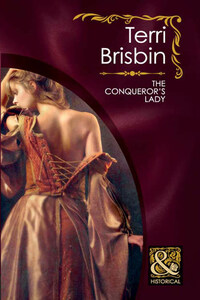âWhy do you insult me so? Do you think I hold my honour, and that of my father, with so little respect that I would succumb easily to the desires of the flesh?â
Giles was out of the chair in a second. He watched her eyes widen as heat grew between them and within him until he burned from it.
He bent his head, forcing Fayth to tilt hers more. When he had moved his lips so close to hers that he could feel her breath against his skin, he paused.
âDesires of the flesh, lady?â he asked, dipping even closer. âBut there is much to commend those desires.â
The aching deep inside Fayth grew into a throbbing need she could not understand or ignore.
âDoes your body not hunger for more, lady? Is there not an aching within to be touched in places you cannot speak of?â
TERRI BRISBIN is wife to one, mother of three, and dental hygienist to hundreds when not living the life of a glamorous romance author. She was born, raised and is still living in the southern New Jersey suburbs. Terriâs love of history led her to write time-travel romances and historical romances set in Scotland and England. Readers are invited to visit her website for more information at www.terribrisbin.com, or contact her at PO Box 41, Berlin, NJ 08009-0041, USA.
Previous novels by the same author:
THE DUMONT BRIDE LOVE AT FIRST STEP
(short story in The Christmas Visit) THE NORMANâS BRIDE THE COUNTESS BRIDE THE EARLâS SECRET TAMING THE HIGHLANDER SURRENDER TO THE HIGHLANDER POSSESSED BY THE HIGHLANDER BLAME IT ON THE MISTLETOE
(short story in One Candlelit Christmas) THE MAID OF LORNE
and in Mills & Boon Historical Undone eBooks:
A NIGHT FOR HER PLEASURE*
*linked to The Conquerorâs Lady
Look for Briceâs story in
THE MERCENARYâS BRIDE Coming soon in Mills & Boon>® Historical
Hastings, England
October 14, 1066
The Duke of Normandy surveyed the rolling fields before him and nodded to his commanders. Satisfaction, much like that of a well-fed cat, filled him as he realised that he would now be king of all he could see and more, much, much more. Anticipation surged through his veins and he smiled at the thought of seeing the faces of the Witan now, now that heâd defeated their anointed king and his forces. The clearing of several throats reminded him of the tasks still ahead. The battle for England, though advancing and in his control, was not a thing accomplished yet.
William turned and met the gazes of his commanders, who stood a short distance from him and his tent. These men and those who fought in their companies of foot soldiers, mounted knights and archers waited on his orders. And they waited for the rewards promised for a successful invasion. Already, the vultures of war were flocking to the battlefield, prepared to scavenge amongst the dead and dying.
âIt will take days to clear the fields, my lord,â Father Obert, his clerk said.
âTheyââ William paused and nodded at the growing number of Norman, Breton, Poitevin, French and even Maine nobles approaching his tent ââdo not seem to have the will to wait several days, Obert.â
William placed his goblet on the table and held out his hand for the parchment Obert had prepared for his review. A list of crucial English properties and fortifications along with the names of the men who would be the benefactors of his largesse. If he approved. Studying it, he recognised several names immediately, and others that were not the expected ones of his closest advisers or commanders.
âWho recommends such rewards to the nameless warriors here?â William suspected he knew, but before he gifted anyone with lands and titles he would understand the other motives in place.
âAs usual, sire, the Bishop oversees that which is vital to your concerns.â Obert did not meet his gaze, but instead bowed his head.
Odo. Half brother and Bishop of Bayeux. He should have recognised the handiwork of the man in this.
âAh, he is ever-vigilant on my behalf.â The words, true though tinged with a slight bit of mockery, drew a sharp snort from his clerk. Obert missed little in the intrigues that were court life, in Normandy and now here in England. It was part of his value. âThese will anger some who have laboured long on my behalf, risking lives and fortunes, only to see the choicest morsels go to others,â he observed.
William took note of three names and knew that even their fathers would object. Those objections, of course, would be couched in the politest terms to avoid mentioning the reason for their angerâthey would want such lands to go to themselves or their legitimate offspring and not their bastards. His smile must have been a dangerous one for Obert backed away and waited without saying a word. Certainly not his usual response to such an open invitation to speak his mind.













